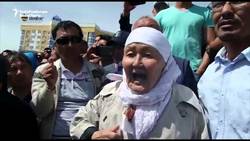Momagri | 6 June 2016
Land purchases: tension in Kazakhstan
From late April to late May several public events were attended by between 1,000 and 2,000 people across the country. The reason for such mobilization in a country where protest is far from tradition, is linked to the changes in the land code that, through auction, will permit the lease of farmland to foreign investors for 25 years (no longer 10 years[1]), particularly Chinese investors, as well as the sale of unused agricultural land to companies provided they are held by Kazakh citizens. For the protesters, the latter provision does not prevent the government from actually selling land to foreigners, namely their Chinese neighbours.
Chinese investments are indeed an extremely sensitive political issue with a population blighted by the current economic crisis (inflationary pressure, falling oil revenues, corruption). Already in 2010, a Chinese proposal to lease vast agricultural lands was rejected following public protest[2].
If the protests are by and large a sign of political rejection of President Nazarbayev, their intensity and the government's response to them reminds us of this sectors’ growing importance as a major strategic asset for the country. Remarkably, faced with the mob, President Nursultan Nazarbayev finally agreed to postpone the implementation of the land code changes for one year while allowing for a special commission for the study of the reform.
Farmland is an important issue for Kazakhstan with an area of 215.5 million hectares, of which 25Mha are cultivated land (10.8%), 181Mha pastures (85%) and 5Mha forage crops (2.2%). Today only 45% of pastures are exploited[3]. Beyond Kazakhstan’s energy incomes, the country has exceptional agricultural potential. Along with Ukraine and Russia it forms the "zernovoï belt" ("grain belt")[4].
With this potential, since the early 2000s, Astana has made Kazakh agriculture a priority in view of escaping its dependency on oil, gas and food. Although the modernization of the agricultural sector remains very slow (dilapidation, logistical problems) despite privatization, Kazakhstan today relies on numerous programs for which significant budgetary resources have been mobilized, including the program “Agribusiness 2020[5]” (promotion of the commercial cooperative model, supporting small farms for them to federate under this model). The arrival of Chinese investors is part of this logic. They are planning on investing $1.9 billion in 19 different agricultural projects across the country[6].
Some analysts see these events as a foreshadow of a scenario similar to that in Ukraine. For others the reform of the land code is also a sign of a commitment to accelerate the modernization of the agricultural sector. Beyond this analysis, the example of Kazakhstan shows that agriculture and food security appear once again to strike a balance between socio-economic, political and geostrategic issues.
1 “New Law Allows Foreign Agricultural Businesses to Lease Kazakh Land for 25 Years”, Astana Times
http://astanatimes.com/2016/02/new-law-allows-foreign-agricultural-businesses-to-lease-kazakh-land-for-25-years/
2 Kazakhs protest against China farmland lease, BBC News
http://news.bbc.co.uk/2/hi/asia-pacific/8489024.stm
3 Ministère de l’Agriculture
http://agriculture.gouv.fr/sites/minagri/files/documents/pdf/fichepays2014-KAZAKHSTAN_cle84e8c6.pdf
4 Atlas de l'agriculture : Comment nourrir le monde en 2050 ?, Atlas Autrement, Jean-Paul Charvet
5 http://www.worldfood.kz/en/press-centre/news/222-investors-are-welcome-to-agriculture
6 http://www.ft.com/intl/cms/s/0/9c84a0f4-15d3-11e6-9d98-00386a18e39d.html#axzz4ALd7zPHh
Land purchases: tension in Kazakhstan
From late April to late May several public events were attended by between 1,000 and 2,000 people across the country. The reason for such mobilization in a country where protest is far from tradition, is linked to the changes in the land code that, through auction, will permit the lease of farmland to foreign investors for 25 years (no longer 10 years[1]), particularly Chinese investors, as well as the sale of unused agricultural land to companies provided they are held by Kazakh citizens. For the protesters, the latter provision does not prevent the government from actually selling land to foreigners, namely their Chinese neighbours.
Chinese investments are indeed an extremely sensitive political issue with a population blighted by the current economic crisis (inflationary pressure, falling oil revenues, corruption). Already in 2010, a Chinese proposal to lease vast agricultural lands was rejected following public protest[2].
If the protests are by and large a sign of political rejection of President Nazarbayev, their intensity and the government's response to them reminds us of this sectors’ growing importance as a major strategic asset for the country. Remarkably, faced with the mob, President Nursultan Nazarbayev finally agreed to postpone the implementation of the land code changes for one year while allowing for a special commission for the study of the reform.
Farmland is an important issue for Kazakhstan with an area of 215.5 million hectares, of which 25Mha are cultivated land (10.8%), 181Mha pastures (85%) and 5Mha forage crops (2.2%). Today only 45% of pastures are exploited[3]. Beyond Kazakhstan’s energy incomes, the country has exceptional agricultural potential. Along with Ukraine and Russia it forms the "zernovoï belt" ("grain belt")[4].
With this potential, since the early 2000s, Astana has made Kazakh agriculture a priority in view of escaping its dependency on oil, gas and food. Although the modernization of the agricultural sector remains very slow (dilapidation, logistical problems) despite privatization, Kazakhstan today relies on numerous programs for which significant budgetary resources have been mobilized, including the program “Agribusiness 2020[5]” (promotion of the commercial cooperative model, supporting small farms for them to federate under this model). The arrival of Chinese investors is part of this logic. They are planning on investing $1.9 billion in 19 different agricultural projects across the country[6].
Some analysts see these events as a foreshadow of a scenario similar to that in Ukraine. For others the reform of the land code is also a sign of a commitment to accelerate the modernization of the agricultural sector. Beyond this analysis, the example of Kazakhstan shows that agriculture and food security appear once again to strike a balance between socio-economic, political and geostrategic issues.
1 “New Law Allows Foreign Agricultural Businesses to Lease Kazakh Land for 25 Years”, Astana Times
http://astanatimes.com/2016/02/new-law-allows-foreign-agricultural-businesses-to-lease-kazakh-land-for-25-years/
2 Kazakhs protest against China farmland lease, BBC News
http://news.bbc.co.uk/2/hi/asia-pacific/8489024.stm
3 Ministère de l’Agriculture
http://agriculture.gouv.fr/sites/minagri/files/documents/pdf/fichepays2014-KAZAKHSTAN_cle84e8c6.pdf
4 Atlas de l'agriculture : Comment nourrir le monde en 2050 ?, Atlas Autrement, Jean-Paul Charvet
5 http://www.worldfood.kz/en/press-centre/news/222-investors-are-welcome-to-agriculture
6 http://www.ft.com/intl/cms/s/0/9c84a0f4-15d3-11e6-9d98-00386a18e39d.html#axzz4ALd7zPHh













